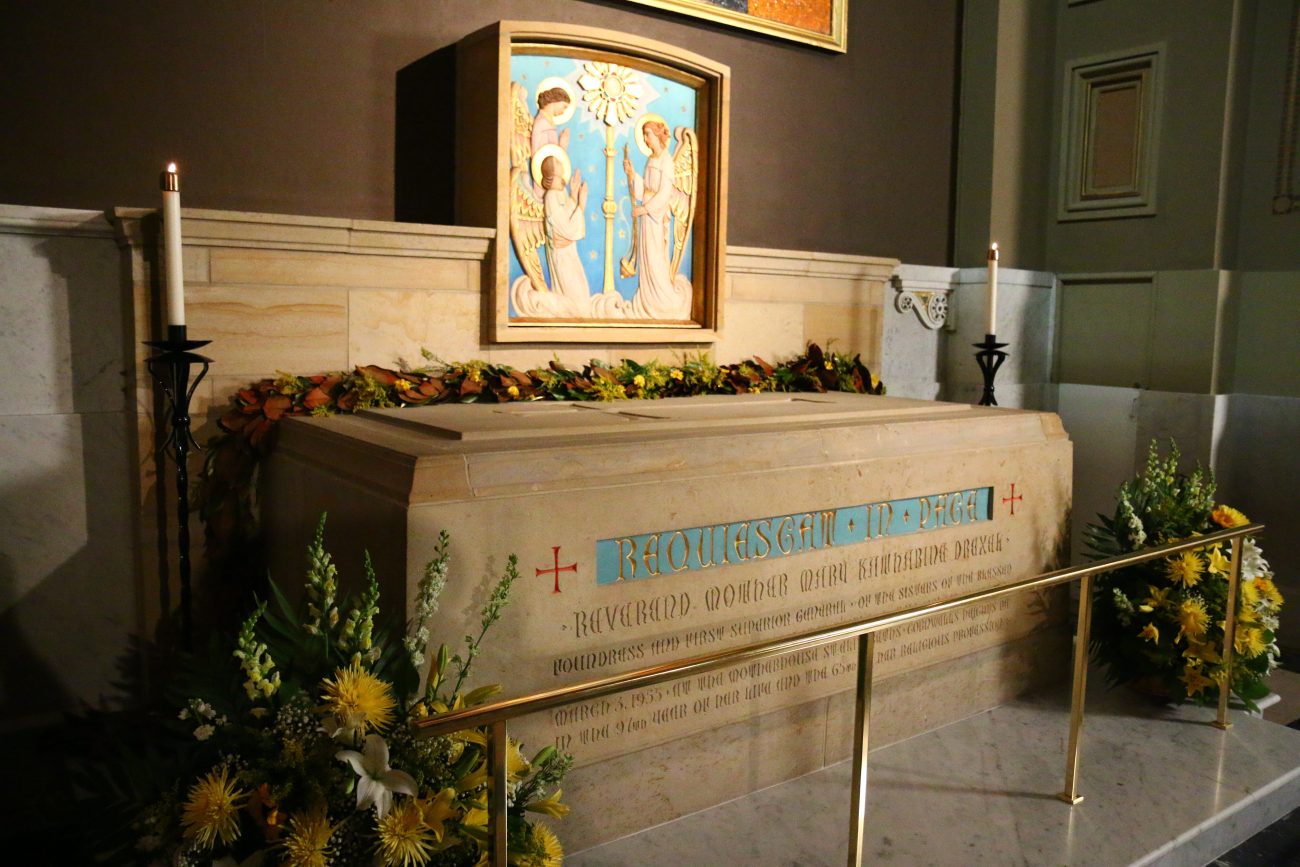Seven months of celebrating the 25th year since the canonization of Philadelphia’s own St. Katharine Drexel are culminating with celebrations marking the date that St. John Paul II declared Mother Katharine a saint on Oct. 1, 2000.
The Cathedral Basilica of SS. Peter and Paul, the resting place of the only saint born in Philadelphia, will be honoring the canonization with a concert and social on Sunday, Sept. 28 at 3 p.m. and with a closing Mass on Sunday, Oct. 5 at 11 a.m.
“For this city, for all places, for all times, she gives us a way to see the Gospel as contemporary, as relevant and possible,” said Father Dennis Gill, the Cathedral Basilica’s rector who attended her canonization.
“I happened to be teaching in Rome at the time. I knew there were going to be lots of Philadelphians there. It was a great occasion. I’m grateful to God that I had that opportunity to be there when she was raised to the altars, when she was canonized a saint.”
What stood out about the canonization Mass for Sister Stephanie Henry, president of the Sisters of the Blessed Sacrament which was founded by St. Katharine, was the “universality of the Church,” she said.
“It was a great celebration. It was a little taste of a global celebration of goodness. That’s exactly how she would want it in a lot of ways, because her ministry was so much ‘Open arms to whoever I’m called to, and open arms to those that maybe we would not have automatically opened our arms to,’” she said.
St. Katharine Drexel was born in Philadelphia on November 26, 1858 into a wealthy family, but was led to a life of missionary work in a private meeting with Pope Leo XIII in January 1887.
She entered the Sisters of Mercy, but later laid the foundation for her own religious order, the Sisters of the Blessed Sacrament. Hers was a calling focused on extending Christ’s compassion to people on the margins of society – particularly Black and Native American people. She founded the order in 1891, locating it in Philadelphia’s Torresdale section.
“I have a feeling there was something about the Drexels in general, something about the idea that you had wealth, but you also used your wealth for the benefit of society. It wasn’t simply for growing your own personal wealth for the sake of being wealthier and wealthier,” said Sister Stephanie.
Initially focusing her ministry on Native Americans, Mother Katharine received a powerful calling to be present to Black American youth, building Catholic schools in Philadelphia and across the East Coast and Midwest.
In 1915, she opened what has become Xavier University in New Orleans, the only Catholic historically Black college in the United States. Her educational ministry grew to serve the marginalized in 21 states and Washington, D.C.
St. Katharine Drexel centered her own inner prayer life, and that of her religious sisters, on Christ in the Eucharist. To her, that was only part of the equation. The other, according to Sister Stephanie, involved reaching out to others and seeing the Body of Christ in the Eucharist reflected in every human being of every background.
“When I look into the face of my neighbor, do I see the light of the Lord in them? Do I see the potential for the light of the Lord? And if I don’t see it, am I humble enough to realize that it’s not their problem, it’s my problem?” Sister Stephanie asks.
“We all need to be healed of various forms of blindness, biases. If we’re really going to be a eucharistic people, then we need to be thankful for every person that God brings our way.”
Mother Katharine died March 3, 1955. Four and a half decades later, she was declared a saint due to a pair of miracles involving Philadelphians.
The two people healed by God through her intercession, “the one that led to her beatification (Robert Gutherman, 1988) and the one that led to her canonization (Amy Wall), were healings of deafness,” said Sister Stephanie.
“Both of the individuals who were healed are members of the Archdiocese of Philadelphia. Both healings that led to her being elevated to the altar of sainthood were Philadelphians.”
Sister Stephanie points to the symbolism in both miraculous cures of deafness: they involve the call to listen to the world around us and respond in just, compassionate love.
“There are many signs in our nation and world and neighborhoods and communities, workplaces, wherever you want to go, that we need the grace of listening to one another,” she said. “We need the grace of hearing.”
“She is a witness to someone who (stood) for justice, for the end of racism, for the end of any discrimination of any kind, and those things we still need,” said Father Gill. “She’s a saint for our day.”
PREVIOUS: Chestnut Hill Catholic School Reopens After Fire
NEXT: AbbeyFest Artists Share Diversity of Styles, Roots in Catholic Faith



Share this story